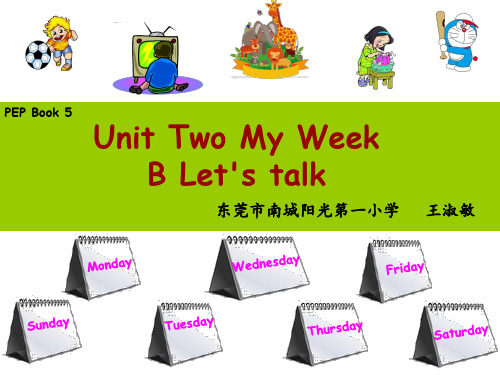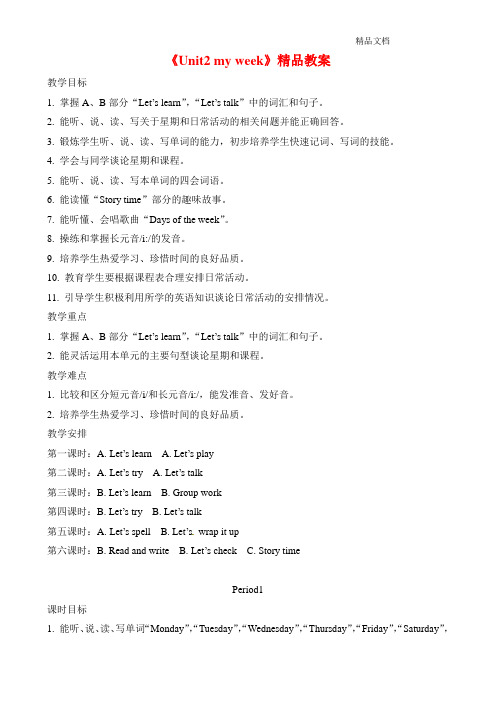PEP新人教版五年级英语上册Unit_2_My_week_Let's_talk_B_PPT_第二单元B部分第四课时第五课PPT课件
人教PEP版 五年级英语 上册 Unit 2 My-week

Read and fill.
clean the room
play basketball
资料下载:/ziliao/
范文下载:/fanwen/
试卷下载:/shiti/
教案下载:/jiaoan/
PPT论坛:
PPT 课件:/k ejian/
语文课件:/kejian/yuw en/ 数学课件:/kejian/shuxue/
(周末活动相同时)
Lynn’s weekend
Zhang Peng: Hi, Oliver. This is Zhang Peng. Let’s play football this afternoon. Oliver: Hi. I will clean my room. Zhang Peng: Do you often clean your room on Saturdays? Oliver: Yes, I do. Zhang Peng: Ok, bye then. See you on Monday. Oliver: Bye.
No, I don’t, I don’t.
Do you often __________ on the weekend? Yes, I do, I do. Do you often __________ on the weekend? No, I don’t, I don’t. Do you often __________ on the weekend? Yes, I do, I do. Do you often __________ on the weekend?
人教版PEP英语五年级上册Unit2 My week A lets talk课件

Work in pairs, act the dialogue out
同桌一组,角色扮演
Which group wants to have a try?
Make a new dialogue
两人一组,创编小对话
Homework:
Finish the exercise book on page 7 (2,3).
What is Mr Young like ? He is funny.
What does John’s grandfather do on Thursdays? He has a cooking class with John’s grandma.
Read and tick or cross. ( T or F ) 1. John has maths,Chinese and music on Thursdays. ( ) 2. John’s music teacher is strict. ( ) 3. John’s grandfather has a cooking class on Thursdays.( )
What class do they have? They have _P_.E_. ___ class.
What class do they have? They have _m_u_s_ic__ class.
What class do they have? They have c_o_m_p_u_te_r class.
完成作业本第7页2,3两题
Read the dialogue for 3 times. (读对话3次)
Make a new dialogue. (创编新对话)
新版PEP五年级英语上册-Unit-2-My-Week-B-Let's-talk

五、教学流程图六、教学过程Step 1. Warm-upFree talk and ice-broken教师与学生进行日常问候,通过歌曲Days of the Week活泼课堂气氛,复习一星期七天的名称。
【设计意图】导入本单元话题,营造轻松愉悦的学习气氛,激活学生的学习思维。
Step 2 Preparation1. 滚动复习Part A语言知识: T: Which day do you like? Why? S: I like …. I have … on ….2. Guessing game引入本课的话题: weekend life。
3. Sharp eyes闪现复习周末活动相关词组。
【设计意图】巧妙呈现主题,让学生初步感知本课学习内容。
复习与周末活动相关的词组,为后面的对话学习做好充分准备。
Step 3 Presentation and practice引入:1. 教师通过展示自己的周末生活,引入often的讲解。
2. :Do you often … ? Yes, I do. No, I don’t.3. Let’s try:以Zhang Peng 和Oliver的通话引出本课背景,学生通过Listen and tick对本课核心句型进行预热。
4. Look and say: 整体呈现课文场景,通过Let’s try的延伸问题,引导学生预测本课Let’s talk 内容。
5. Listen and answer: 听第一遍课文录音,验证学生的推测是否正确。
【设计意图】教师首先整体呈现对话场景,设置预测任务,引导学生读图,理解语境,激发学生的学习兴趣,培养学生的观察能力和听力理解能力。
文本处理:1. 呈现抽空核心句型的对话架构,引导学生回忆Zhang Peng和Sarah说过的话。
听第二遍录音后,请学生答复并验证是否正确。
2. 将核心句子拆分成词块呈现,学生通过group work活动将词块连成句子,并写下来。
人教版英语五年级上册-Unit 2My week A Let’s talk

Unit 2 My week
Part A Let's talk
一、教学目标
1.能够听、说、认读有关学科和星期的词汇:Chinese, English, music, art, cooking class, Wednesday, Thursday
2.能够运用句型“What do you have/do on ...? I have...”询问并回答某人某天的课程或活动安排。
3.通过谈论学校课程安排,引导学生学会合理安排时间,学会时间管理。
二、教学重难点
重占・
1.能够听、说、认读句型:What do you have/do on ...?I have...
2.能够在情境中运用句型“What do you have/do on…?I have.”询问并回答某人某天的课程安排或活动某人。
难点:
能熟练运用句型"What do you have/do on ...? I have...”询问并回答某人某天的课程安排或活
动安排。
三、教学准备
教学课件,录音,课文视频
四、教学过程
Presentation
五、板书设计
Unit 2My week
Part A Let's try&Lefs talk
A: What do you have on Wednesdays/Thursdays/...?
B: I/We have music/art/English/...。
PEP人教版五年级上册英语Unit-2-My-week-B-Let's-talk

Sarah, Sarah!
_D_o__yo_u_o_ft_e_n __r_ea_d__bo_o_ks __i_n _th_i_s _pa_r_k_?
___N_o_, _I__ ___N_o,_I___
don't.
don't.
Zhang Peng, Zhang Peng!
_D_o_y_o_u _o_ft_e_n __p_la_y_f_o_ot_b_a_ll _ h_e_re_ ?
read books
Lead-in
It’s Saturday morning. Zhang Peng calls Oliver. Listen and tick.
√
Let’s try
It’s Saturday morning. Zhang Peng calls Oliver. Listen and tick.
Sarah: No, I don't. _D_tb_a_ll_ here ?
Zhang: Yes, I do. I like this park very
much.
Sarah: Me too.
Let's chant
Oliver, Oliver! _D_o__yo_u_o_ft_e_n_ _c_le_an__th_e_r_oo_m_ __o_n_S_a_tu_r_da_y_ ? Yes, _I_d_o_._ Yes, _I__do_._
1. Listen and imitate the dialogue on P17.
2. Watch the micro-lesson.
Now, they are
at home.
Now, they are on the
人教版PEP五年级上册英语《 Unit 2 my week Part A Let’s talk》教案

人教版PEP五年级上册英语《Unit 2 my week Part A Let’s talk》教案一. 教材分析《人教版PEP五年级上册英语Unit 2 My Week Part A Let’s talk》这一课的主题是关于描述一周的活动。
教材通过生动的插图和情景对话,让学生们在真实的语境中学习并掌握表示日常活动的词汇,如“go swimming”, “play soccer”, “watch TV”等。
此外,本课还涉及到一般现在时的表达方式,培养学生运用英语进行交流的能力。
二. 学情分析五年级的学生已经掌握了基本的英语语法和词汇,具备一定的听说读写能力。
在学习本课之前,学生们已经学习了表示时间的词汇如“monday”, “tuesday”等,以及一些日常活动的词汇。
因此,在学习本课时,学生们可以借助已有的知识储备,更好地理解和掌握新知识。
三. 教学目标1.知识目标:学生能够听懂、会说、会读本课的生词和句子,掌握一般现在时的表达方式。
2.能力目标:学生能够在真实语境中运用所学词汇和句子进行交流。
3.情感目标:培养学生热爱生活,积极参与体育活动的态度。
四. 教学重难点1.重点:学生能够掌握表示日常活动的词汇和一般现在时的表达方式。
2.难点:学生能够正确运用一般现在时描述自己的周末活动。
五. 教学方法采用任务型教学法、情境教学法和交际法。
通过设置真实的情境,让学生在参与活动的过程中自然而然地学习并掌握英语知识。
同时,注重师生互动、生生互动,激发学生的学习兴趣,提高学生的参与度。
六. 教学准备1.教具:PPT、图片、卡片、录音机等。
2.教学资源:网络资源,如相关视频、音频等。
七. 教学过程1.导入(5分钟)利用图片展示一周的活动,引导学生谈论自己喜欢的活动。
例如:“What do you like t o do on weekends?”学生回答后,教师总结并板书关键词。
2.呈现(5分钟)教师播放PPT,展示本课的生词和句子。
新人教PEP五年级英语上册《Unit2 my week》精品教案.doc

《Unit2 my week》精品教案教学目标1. 掌握A、B部分“Let’s learn”,“Let’s talk”中的词汇和句子。
2. 能听、说、读、写关于星期和日常活动的相关问题并能正确回答。
3. 锻炼学生听、说、读、写单词的能力,初步培养学生快速记词、写词的技能。
4. 学会与同学谈论星期和课程。
5. 能听、说、读、写本单词的四会词语。
6. 能读懂“Story time”部分的趣味故事。
7. 能听懂、会唱歌曲“Days of the week”。
8. 操练和掌握长元音/i:/的发音。
9. 培养学生热爱学习、珍惜时间的良好品质。
10. 教育学生要根据课程表合理安排日常活动。
11. 引导学生积极利用所学的英语知识谈论日常活动的安排情况。
教学重点1. 掌握A、B部分“Let’s learn”,“Let’s talk”中的词汇和句子。
2. 能灵活运用本单元的主要句型谈论星期和课程。
教学难点1. 比较和区分短元音/i/和长元音/i:/,能发准音、发好音。
2. 培养学生热爱学习、珍惜时间的良好品质。
教学安排第一课时:A. Let’s learn A. Let’s play第二课时:A. Let’s try A. Let’s talk第三课时:B. Let’s learn B. Group work第四课时:B. Let’s try B. Let’s talk第五课时:A. Let’s spell B. Let’s wrap it up第六课时:B. Read and write B. Let’s check C. Story timePeriod1课时目标1. 能听、说、读、写单词“Monday”,“Tuesday”,“Wednesday”,“Thursday”,“Friday”,“Saturday”,“Sunday”和“w eekend”。
2. 能在创设的实际情景中灵活运用句型“What do you have on …?”,“I have …”。
人教PEP版五年级上册英语Unit2 My week A let's spell 课件

Unit2 My week
Part A Let’s spell
No candy for the baby. No candy for the baby. I am sorry little baby. But no candy for the baby.
he
she
me
we
pen
bed
meet feet beef
Week—weep—weed... Can you try?来自seegeese
jeep
sheep
week sweet queen green
Okay!
Zoom, let’s go to the sea.
Wow! Look at the sea.
I like to _r_e_a_d by the sea.
sea
meat
bean
leaf
seat
pea
ee feet beef meet
ea tea read eat
feet meet
beef read
tea eat
sea
twhmbhfree tfl
remdrtp ea tdl
meal deal
bee
feel
knee
please
sea
feed
wheel meat
Have some _b_e_e_f and _t_e_a_.
I like to _r_ea_d_ by the sea.
_F_e_ed_ the baby.
I like to read by the sea. Have some beef and tea. Feed the baby.
- 1、下载文档前请自行甄别文档内容的完整性,平台不提供额外的编辑、内容补充、找答案等附加服务。
- 2、"仅部分预览"的文档,不可在线预览部分如存在完整性等问题,可反馈申请退款(可完整预览的文档不适用该条件!)。
- 3、如文档侵犯您的权益,请联系客服反馈,我们会尽快为您处理(人工客服工作时间:9:00-18:30)。
Unit 2
My week !
B Let's talk
Sunday morning, up with the lark I think I'll take a walk in the park Hey, hey, hey, it's a beautiful day I've got someone waiting for me And when I see her I know that she'll say Hey, hey, hey, it's a beautiful day Hi, hi, hi, beautiful Su-nday This is my, my, my, beautiful day-ay-ay When you say, say, say, say that you lo-ove me Oh-oh-oh my, my, my, it's a beautiful day Birds are singing, you by my side Lets take a car and go for a ride Hey, hey, hey, it's a beautiful day We'll drive on and follow the sun Making Sunday go on and on
Mickey: I often play football.
Little bear: I often do my homework.
What do you often do on Sundays?
Mickey: ____________________. I often play football. I often do my homework. Little bear: ____________________. I often read books. Big bear: I _____________________. often watch TV. I often wash my clothes. Rabbit: ___________________.
2.完成所学部分的基础训练 3.预习p18
Good bye !
Do you often do homework in the kitchen? Do you often do homework in the study? Do you often watch TV in the living room?
练习读!
大声背!
我能行!
Homework:
1.背诵并会表演这节课所学对话
read books
do homework
Who's this?
Lyou often do on Sundays?
Rabbit: I often watch TV.
A Li: I often wash my clothes.
Big bear: I often read books.
What can you see in the picture? I can see ... .
What's this?
It's a football.
What's that?
It's a storybook. It's a park.
Where is here?
here 这里
仔细听!
认真学!
我会译!
Do you often read books in the park? No, I don't. Sarah: _____________. Do you often play football in the park? I do. Zhang Peng: Yes, _________________.
Beautiful Sunday
Yes or No ? If it is right, read it. If it is wrong, say “no”.
Let's review
read books
do homework
watch TV
read books
play football
wash my clothes
Let's talk
Yes,I do. No,I don’t.
Do you often play football in the park?
Do you often read books in the WC?
Do you often wash your clothes in the
classroom?
